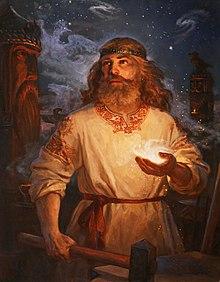
Svarog
Since time immemorial, man has sought answers to fundamental questions: how was the world created and are there any transcendental beings? Before Christianization, the Slavs also had their own unique belief system. They were polytheists - besides, polytheists were extremely popular with most peoples before the advent of the Christian faith in one God. Slavic gods create big problems for modern researchers, because our ancestors did not leave any written sources - they did not know this way of expressing thoughts. It is also worth adding that individual deities had different meanings in certain regions of the Slavic region. Each city had its own favorite patrons, to whom it made especially generous donations.
Researchers consider Svarog one of the most important deities of the ancient Slavic region. He was worshiped as the god of the sky and the protector of the sun. Long after Christianization, the Slavs turned to heaven with prayers. He was also considered the protector of the craftsmen - he allegedly forged the sun and placed it on a blue cloth, making it travel the horizon every day. Heaven has always been associated with something like inaccessibility for people - Svarog seems to be an extremely mysterious god. However, much in the case of Slavic beliefs remains a matter of guesswork. The very meaning of Swarog is a kind of mystery - we know another god, Perun, the Thunderer, who was the god of storm and thunder. Such a field of activity probably means that the cult of both deities had to be mutually exclusive and dependent on a particular region. We must remember that the Slavs inhabited more than half of the European continent during their heyday, so it cannot be assumed that beliefs were identical everywhere. It can be assumed that this was probably more important in Northern Europe - after all, the south, heavily influenced by Ancient Greece, probably recognized the superiority of Perun, whom he associated with Zeus, the Lord of Heaven. Without going beyond Greek culture, it has traditionally been compared to the popular Swarog. However, it seems that the Slavic version of the deity was of greater importance to the society in which it existed.
Svarog has survived to this day in the names of some places. For example, historians associate this deity with the origin of the city of Swarzedz, which today is located in the Greater Poland Voivodeship in the vicinity of Poznan. Other names of villages in Labe and Rus also came from the name of Svarog. The rituals in honor of Svarog, unfortunately, are not fully known today. However, it seems that the holidays that may be associated with this deity are the Lavish wedding that our ancestors celebrated at the end of December, marking the winter solstice. This was considered a victory for the Sun, day over night and darkness, because since then, as we know, daytime has only increased over the next six months. Usually this holiday is associated with the god of magic Veles, because during the rituals, various fortune-telling for the next year's harvest was performed. Svarog, however, as a sun god who will stay in heaven for longer and longer, is also of great importance, and the cult and memory, of course, belonged to him that day. The Slavs, like most peoples of that time, were mainly engaged in agriculture, and their survival depended on a possible harvest or natural disasters.
Leave a Reply